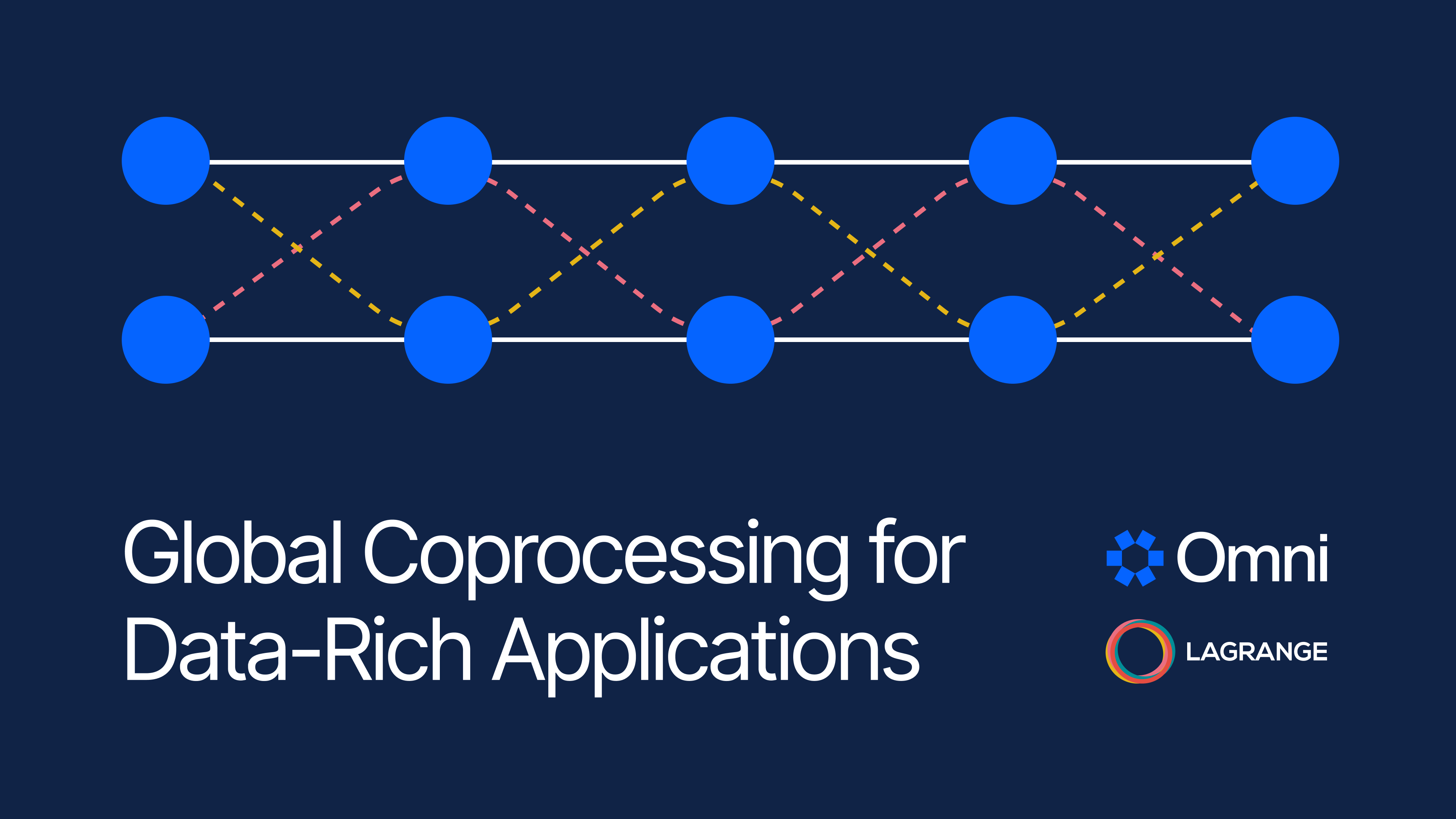Global Coprocessing for Data-Rich Applications

Omni and Lagrange are new developer primitives for the Ethereum infrastructure stack. Together, they enable an entirely new class of data-driven applications by providing global coprocessing across all Ethereum rollups.
A Global Coprocessor for Ethereum
Omni is an Ethereum-native interoperability protocol that establishes low latency communications between all Ethereum rollups, allowing Ethereum to function as a cohesive system in the modular age. By integrating Omni, developers unlock access to all of Ethereum's liquidity and users from a single source. Furthermore, developers can connect to innovative infrastructure offerings like Lagrange’s Zero Knowledge (ZK) coprocessor from anywhere within the Ethereum ecosystem.
ZK coprocessors are poised to usher in a new generation of data-rich decentralized applications. Today’s Web3 applications struggle to match the complexity and data-handling capabilities of their Web2 equivalents, which rely on large datasets and sophisticated algorithms to craft personalized and dynamic experiences for users. This is primarily due to the high costs of on-chain computation. For instance, although it's technically feasible to run credit scoring calculations against historical wallet data, the associated gas costs render this analysis economically unviable. While off-chain computation in a trusted environment could bypass these costs, it would compromise the trustless nature of these applications. Here, Lagrange emerges as a pivotal innovation, offering a trustless method for computation over historical on-chain data.
In traditional computing, a coprocessor refers to a hardware chip that enhances the CPU with specialized operations. Lagrange extends the analogy of a physical coprocessor chip to blockchain networks by statelessly proving off-chain computation over existing on-chain data. This allows applications to decouple data access and compute from the blockchain’s core execution logic, thereby removing the design constraints that have historically limited developers’ ability to create data-rich applications. Lagrange’s ZK coprocessor is also unique in delivering hyper-parallel computation and distributed proof generation, proof recycling, and secure state access - all of which result in more scalable, efficient and cost-effective smart contract operations.
Lagrange’s data queries can be delivered to any Ethereum rollup using Omni as a fast and secure global transport layer. By leveraging these two primitives in tandem, developers can unify their application instances with the power of global coprocessing.

Consider a practical scenario where a lending protocol operates across various rollups. Using Omni, the protocol can treat these distributed liquidity sources as a single unified capital pool accessible to borrowers on any rollup. The protocol can implement a universal borrowing rate that is determined by the outstanding borrows across each rollup. To do this, the protocol submits a request to Lagrange to calculate the universal interest rate. Lagrange’s ZK coprocessor tracks the state of each rollup application, computes the universal borrowing rate, and generates an associated proof of the computation. Acting as the global transport layer, Omni relays the calculation result and proof to all connected rollups, ensuring users receive the same borrowing rate on every rollup.
Finally, Omni and Lagrange will work together to deploy Lagrange’s ZK coprocessor on the Omni EVM. This will allow developers to incorporate Lagrange’s ZK coprocessor functionality directly into Natively Global Applications deployed on the Omni EVM and bypass the need to separately relay query results to each rollup application instance.
Omni and Lagrange can be used in tandem to significantly enhance the functionality of applications without sacrificing security guarantees. Both protocols are among the first Actively Validated Services (AVS) that will be secured using restaked $ETH from EigenLayer. While both protocols are still pre-mainnet, each has secured over $1 billion in restaked $ETH commitments from top liquid restaking protocols to offer industry-leading security at launch without incurring excessive bootstrapping costs. Together, Omni and Lagrange are positioned to provide critical infrastructure for the next generation of data-rich Ethereum applications.

